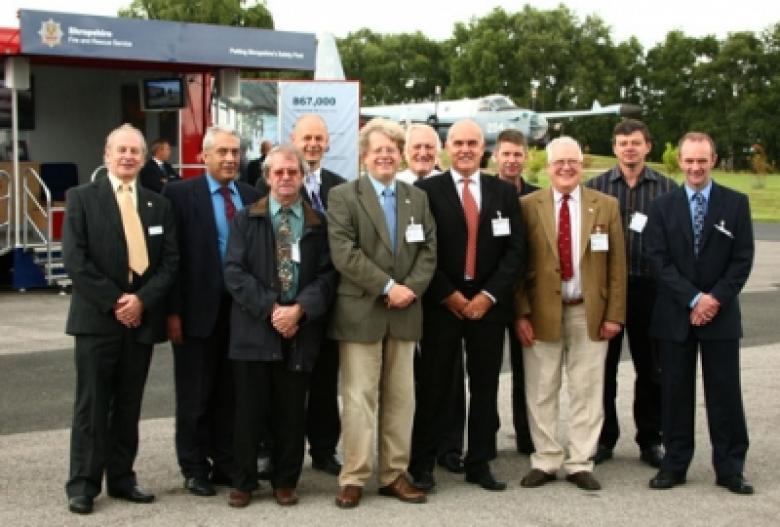
A unique conference organised by Shropshire Fire and Rescue Service aimed at improving the retained service by sharing best practice has been hailed an overwhelming success with the hope of more similar events to be held in the future.
More than 150 delegates from 39 fire and rescue services from the Highlands and Islands of Scotland down to the Isle of Wight gathered in the lecture theatre in the shape of a bunker inside the outstanding visitor attraction of the RAF Cosford museum, near Telford.
Everyone from senior officers, to non uniform staff and retained firefighters who attended, had one goal - to discuss problems facing the retained service and show how these could be overcome.
Conference organiser Phil Clarke, Retained Project Manager at Shropshire FRS, told the audience how Shropshire had improved its Retained Service by firstly carrying out a review which eventually led to an investment of more than £800,000 by the local Fire Authority.
This had led to more pay for retained firefighters, the introduction of XL cabs, increased training time and an employment boost with eight Retained Support Officers (RSOs) - a "floating" watch who had helped to keep rural appliances on the run and relieved pressure at many of Shropshire's retained fire stations.

Conference organisers Phil Clarke and Shropshire CFO Alan Taylor

Delegates from 39 FRSs attended the Shropshire conference to hear about best practice for the retained
The RSOs had organised open days, launched important community fire safety initiatives, set up numerous training exercises and carried out important liaison with employers to boost recruitment. They had given "peace of mind" to over worked retained officers and had for the first time enabled rural stations to get involved with community initiatives such as fitting door locks and smoke alarms into people's houses and carrying out important partnership work.
RSO Glyn Davies, of Ludlow, said: "We are not sat twiddling our thumbs. We are having a big impact and our work in the community has led to a reduction in calls."
Shropshire FRS - similar to many in the UK - is highly dependent on its retained staff and the huge investment by the Fire Authority has made the service much more family friendly and has boosted recruitment, the conference heard.
Martin Henderson, Head of Operations for the Retained Duty System (RDS) in South Wales FRS revealed how the retained were now treated as a professional service similar to wholetime and there were no more "black Wednesdays" when 28 out of 38 retained appliances in South Wales were off the run.
There had been significant investment in the retained with a new payments system and people were "queuing" to join the service. Recruitment had been streamlined as the lengthy process of waiting six months for an interview had put off applicants, he said.
"For us it has worked. It is about doing something different. I wouldn't want to go back to the old system. We have higher expectations now," he added.
The findings of a survey of UK fire and rescue services on the implementation of IPDS for the retained were revealed to delegates by Chris Millard, IPDS Team Leader at the CLG.
He explained that the survey showed that many FRSs had made "good progress" with examples of significant levels of implementation of certain components of IPDS. Positive findings included many services used National Occupational Standards, had trained RDS managers, used e learning and undertook personal development reviews. But there were "gaps" with the low number of FRSs offering NVQs and many not having external validation of movement from development to competent rates of pay.

Martin Henderson
South Wales FRS

Speakers at the conference
Outside the conference, three retained firefighters from Cumbria FRS, said they were pleased with the information from the conference especially about RSOs but were concerned that the finance to fund such new initiatives for the retained service in their own county may not be available.
"There are problems of money. But it is good to see everyone getting together to share problems and find solutions," said Leading Firefighter Peter Gorman, who with his colleagues would be reporting back to their Chief Fire Officer.
Philip Powell, of the Fire and Resilience Directorate at the Communities and Local Government told delegates: "Most problems in the FRS can be resolved. It is important that we talk to each other and involve our members whose support we need to allow us to provide the finance."
Shropshire's CFO Alan Taylor said he was "thrilled to bits" that delegates had come to the conference from all over the UK to share best practice.
"We at SFRS have been recognised as taking our own retained service forward. But we are not resting on our laurels and we realise that there is still a lot more that we can learn from others to ensure that our dedicated and committed retained firefighters get all the recognition and support that they so truly deserve," he said.
The conference was organised due to demand from other FRSs for more sharing of ideas and information after Shropshire FRS attended workshops in London and Manchester providing feedback on the outcomes of last year's Operational Assessment of Service Delivery. At these workshops it was recognised that much good work was going on across the UK to improve the retained service but that the sharing of best practice was very limited.

"We should be working towards a one service culture," said Sue Evans, Head of the National Assessment Unit

Vera Bell, head of HR told the conference that at Leicestershire FRS they had work to do to overcome the barrier between retained and wholetime but to do nothing was "not an option."




